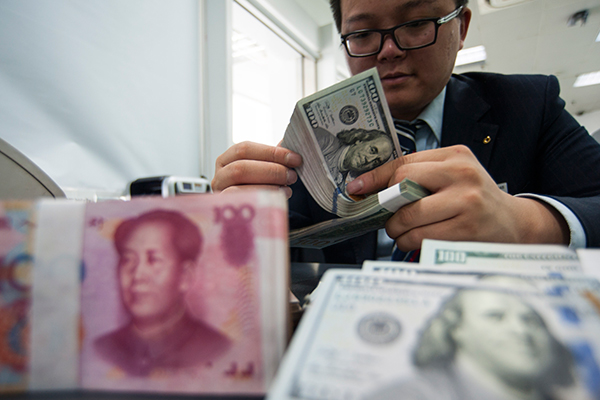Media Report

- The Wall Street Journal reports: "China continued to squeeze the global market for the yuan Friday, sending the cost of borrowing the currency in overseas markets soaring to a near-record high. Investors and analysts say the nosebleed rates are likely to continue as China's central bank battles to keep the country's currency from weakening too far and fast. The rate that banks charge each other in Hong Kong's overnight lending market for the yuan jumped to 61.3% on Friday--the highest in a year and the second-highest level on record. That rate was 38.3% on Thursday, and has remained above 10% since Dec. 30...Although the PBOC has kept the currency stronger than 7.0 yuan to the dollar for now, many market watchers say a weaker level is inevitable...That means the PBOC will likely continue to tighten offshore liquidity and send investors running out of negative yuan bets in the next few weeks, as well as bolster the currency against a wave of outflows as residents exchange yuan for foreign cash."
- Quartz comments: "On Dec. 30, the city of Beijing was put under an orange smog alert, the second-highest warning level issued for smog pollution...things did not go as expected, and so Beijing extended the same warning again—now, officials say, things should get better by Jan. 7. But the current pollution level already qualifies for a red alert—the highest warning. A red alert, according to official standards, should be issued when the air quality index (AQI) is over 200 for four consecutive days, among which two days are above 300. (A red alert should also be issued if AQI reaches 500 on a single day.) Even an AQI above 100 is considered unhealthy...It's not just semantics. There are real public health consequences of avoiding issuing a red alert: under an orange alert, primary and middle schools are advised to suspend classes, while it is compulsory under a red alert."
- Reuters reports: "Bitcoin plunged another 12 percent on Friday after China's central bank urged investors to take a rational approach to the digital currency, which has is on track for its heaviest two-day falls in two years. Bitcoin had gained more than 40 percent in two weeks to hit a three-year high of $1,139.89 on Wednesday, just shy of its all-time record of $1,163 on the Europe-based Bitstamp exchange. But the digital currency - which has shown an inverse correlation to the Chinese yuan in recent months - plunged as the yuan soared on Thursday, falling as much as 20 percent at one point, before closing the day around 10 percent down on the day. On Friday it fell to $887, having lost almost a quarter of its value since Wednesday's peak. Bitcoin prices had showed abnormal fluctuations, the Shanghai head office of the People's Bank of China (PBOC) said in a notice. It stressed bitcoin is not a currency and cannot be circulated as a real currency in the market."
Calendar
- 2017-01-05 China to invest £292bn in renewable power by 2020
- 2017-01-04 With Choice of Trade Negotiator, Trump Prepares to Confront Mexico and China
- 2017-01-03 Wilbur Ross’s Chinese Love Affair
- 2017-01-02 Surge in Chinese corporate investment into the US
- 2016-12-23 In China's Tiny Catholic Community, Hopes Rise For Beijing-Vatican Ties
- 2016-12-22 Trump taps China trade critic Navarro for new White House post
- 2016-12-21 On China: A Conversation With Larry Summers
- 2016-12-20 Smog Chokes Chinese Cities, Grounding Flights, Closing Roads
- 2016-12-19 Donald Trump’s Shock Doctrine Will Make China Even Stronger
- 2016-12-18 Tensions Linger Over Seizure of Survey Drone in South China Sea
News
- The Wall Street Journal China Doubles Down on Defending Its Currency
- Reuters Bitcoin extends losses, slides another 12 percent on China warning
- The New York Times Chinese Defy Pollution, a Stubborn Visitor
- The Guardian China cementing global dominance of renewable energy and technology
- The Associated Press Gas Outburst in Central China Coal Mine Kills 12
- The New York Times Chinese Submarine's Malaysian Port Call Signals Regional Power Shift
- The Financial Times Taiwan tries to keep Central American allies away from China
- The Associated Press DEA Ramping Up China Activity With Visit, Planned Expansion
- The Wall Street Journal Chinese Submarine's Malaysian Port Call Signals Regional Power Shift
- The Washington Post Chinese tech firms look to CES as a launchpad for the U.S.
- The Financial Times New China options to pave way for open commodities trading
- Reuters Exclusive: China's ZTE to slash about 3,000 jobs - sources
- Bloomberg China Ready to Step Up Scrutiny of U.S. Firms If Trump Starts Feud: Sources
Commentary
- Quartz Beijing is playing down its pollution problem
- Fortune China Praises Apple, Blasts NYT Over App Store Blackout
- The New York Times: Sinosphere How the Qing Court Sowed the Seeds of Environmental Protection in China
- The Washington post: Worldviews Stop making our children sick: Beijing parents force government action over smog
- Bloomberg: Gadfly Boeing Can Survive a China Trade War
- The Financial Times Beijing's dangerous mix of trade and security
- Foreign Policy Cambodia Wants China as Its Neighborhood Bully
